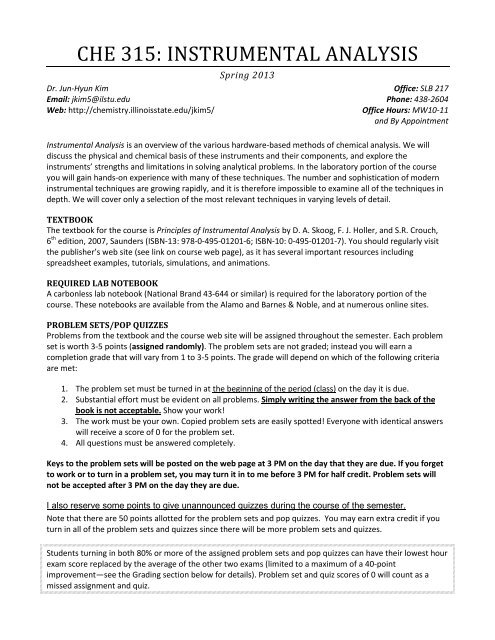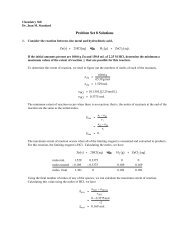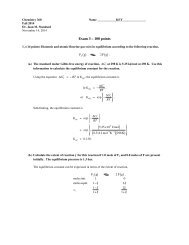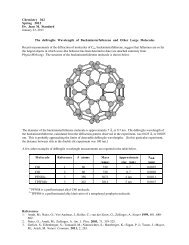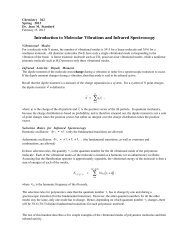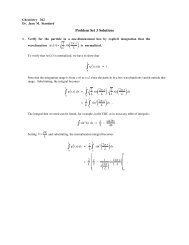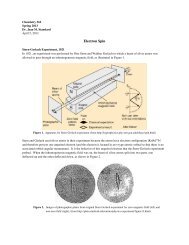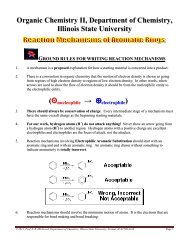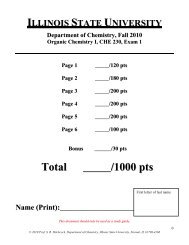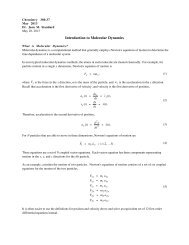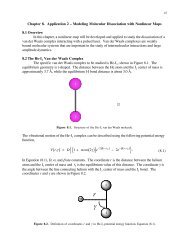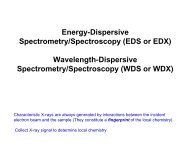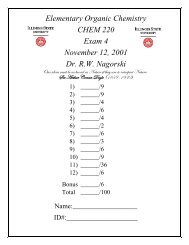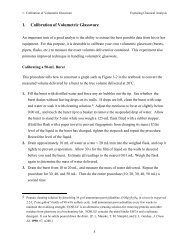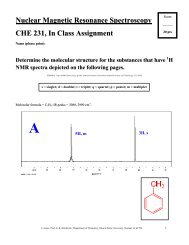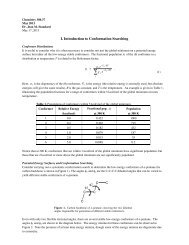CHE 315: INSTRUMENTAL ANALYSIS
CHE 315: INSTRUMENTAL ANALYSIS
CHE 315: INSTRUMENTAL ANALYSIS
You also want an ePaper? Increase the reach of your titles
YUMPU automatically turns print PDFs into web optimized ePapers that Google loves.
<strong>CHE</strong> <strong>315</strong>: <strong>INSTRUMENTAL</strong> <strong>ANALYSIS</strong><br />
Dr. Jun-Hyun Kim<br />
Email: jkim5@ilstu.edu<br />
Web: http://chemistry.illinoisstate.edu/jkim5/<br />
Spring 2013<br />
Office: SLB 217<br />
Phone: 438-2604<br />
Office Hours: MW10-11<br />
and By Appointment<br />
Instrumental Analysis is an overview of the various hardware-based methods of chemical analysis. We will<br />
discuss the physical and chemical basis of these instruments and their components, and explore the<br />
instruments’ strengths and limitations in solving analytical problems. In the laboratory portion of the course<br />
you will gain hands-on experience with many of these techniques. The number and sophistication of modern<br />
instrumental techniques are growing rapidly, and it is therefore impossible to examine all of the techniques in<br />
depth. We will cover only a selection of the most relevant techniques in varying levels of detail.<br />
TEXTBOOK<br />
The textbook for the course is Principles of Instrumental Analysis by D. A. Skoog, F. J. Holler, and S.R. Crouch,<br />
6 th edition, 2007, Saunders (ISBN-13: 978-0-495-01201-6; ISBN-10: 0-495-01201-7). You should regularly visit<br />
the publisher’s web site (see link on course web page), as it has several important resources including<br />
spreadsheet examples, tutorials, simulations, and animations.<br />
REQUIRED LAB NOTEBOOK<br />
A carbonless lab notebook (National Brand 43-644 or similar) is required for the laboratory portion of the<br />
course. These notebooks are available from the Alamo and Barnes & Noble, and at numerous online sites.<br />
PROBLEM SETS/POP QUIZZES<br />
Problems from the textbook and the course web site will be assigned throughout the semester. Each problem<br />
set is worth 3-5 points (assigned randomly). The problem sets are not graded; instead you will earn a<br />
completion grade that will vary from 1 to 3-5 points. The grade will depend on which of the following criteria<br />
are met:<br />
1. The problem set must be turned in at the beginning of the period (class) on the day it is due.<br />
2. Substantial effort must be evident on all problems. Simply writing the answer from the back of the<br />
book is not acceptable. Show your work!<br />
3. The work must be your own. Copied problem sets are easily spotted! Everyone with identical answers<br />
will receive a score of 0 for the problem set.<br />
4. All questions must be answered completely.<br />
Keys to the problem sets will be posted on the web page at 3 PM on the day that they are due. If you forget<br />
to work or to turn in a problem set, you may turn it in to me before 3 PM for half credit. Problem sets will<br />
not be accepted after 3 PM on the day they are due.<br />
I also reserve some points to give unannounced quizzes during the course of the semester.<br />
Note that there are 50 points allotted for the problem sets and pop quizzes. You may earn extra credit if you<br />
turn in all of the problem sets and quizzes since there will be more problem sets and quizzes.<br />
Students turning in both 80% or more of the assigned problem sets and pop quizzes can have their lowest hour<br />
exam score replaced by the average of the other two exams (limited to a maximum of a 40-point<br />
improvement—see the Grading section below for details). Problem set and quiz scores of 0 will count as a<br />
missed assignment and quiz.
ATTENDANCE<br />
You are expected to attend all class meetings. Attendance will be the deciding factor for borderline grades.<br />
ACADEMIC HONESTY<br />
While you are encouraged to work together on the data for your lab reports and homework, all work that you<br />
turn in must be your own. Substantially similar lab reports and homework will be returned ungraded. Problem<br />
cases will be dealt with according to University policy.<br />
EXAM POLICY<br />
• The following items are prohibited during exams: cell phones, earbuds/earphones, MP3 players, PDAs,<br />
and programmable calculators. Other items may be added to the list as necessary.<br />
• You will be provided with a non-programmable calculator for use during exams.<br />
• All exams are scheduled for 50 minutes. They will begin promptly at 8:00 am and will be collected at<br />
8:50 am.<br />
• Exams may be returned to the faculty member after students check their grades.<br />
MAKE-UP EXAMS<br />
Make-up exams will be given for valid excuses only if arrangements are made before the scheduled exam.<br />
Failure to inform me of an absence from an exam will result in a zero for that exam. All make-up exams will be<br />
substantially different from the exam given at the scheduled time.<br />
FINAL EXAM S<strong>CHE</strong>DULE CHANGES<br />
You may take the final exam at a time other than the scheduled time only if you<br />
a) have 3 or more exams scheduled on the same day<br />
b) submit to me a form verified by the registrar (see http://www.arr.ilstu.edu/faculty_staff/final_exam/)<br />
c) make arrangements at least 1 week before the scheduled exam<br />
GRADING (LECTURE PORTION)<br />
Your score in the lecture part of the class will be based on homework assignments/pop quizzes, two lab<br />
quizzes (25 points each), and three exams (two 75-point hour exams and a 150-point final). The final exam will<br />
consist of a 75-point portion covering the final third of the course and a 75-point comprehensive portion.<br />
Your lowest 75-point exam score (excluding the comprehensive portion of the final) will be replaced by the<br />
average of your other two 75-point exams with the following both conditions:<br />
a) you must turn in at least 80% of the homework assignments<br />
b) your score can only improve by a maximum of 40 points (i.e. if you skip an exam your maximum score<br />
will be 40 out of 75, or 53% — still an F).<br />
EXAM S<strong>CHE</strong>DULE<br />
Problem Sets/Quizzes<br />
Exam 1<br />
Exam 2<br />
Lab Quiz 1 (Before Lab Period 8)<br />
Lab Quiz 2 (Before Lab Period 9)<br />
Final Exam<br />
Exam 3 Portion<br />
Comprehensive Portion<br />
Total (Lecture)<br />
POINTS<br />
50<br />
75<br />
75<br />
25<br />
25<br />
75<br />
75<br />
400
OVERALL GRADE CALCULATION<br />
Your final grade will be based on your performance in the lecture and laboratory portions of the course. A final<br />
percentage will be calculated based on a weighted average of your lecture (2/3) and laboratory (1/3)<br />
percentages. Your final grade will be based upon this final calculated percentage. The guaranteed minimum<br />
grading scale is: >90% = A; 80-90% = B; 65-80% = C; 55-65% = D;
LECTURE S<strong>CHE</strong>DULE<br />
NOTE: EXAM DATES ARE FIRM, BUT ORDER OF TOPICS MAY DEVIATE FROM THE S<strong>CHE</strong>DULE<br />
TOPIC<br />
Electricity and Electronics (LAB LECTURE)<br />
*Introduction (Lab Week 1)<br />
*Components and Simple Circuits (Lab Week 7)<br />
*Operational Amplifiers (Lab Week 8)<br />
Introduction<br />
Chromatography and Electrophoresis<br />
Chromatographic Theory<br />
Gas Chromatography<br />
HPLC<br />
Capillary Electrophoresis<br />
Mass Spectrometry<br />
Atomic Mass Spectrometry<br />
Molecular Mass Spectrometry<br />
Electrochemistry<br />
Activity/Electrochemical Cells<br />
Potentiometry<br />
Voltammetry (Time Permitting)<br />
EXAM 1: Wednesday, FEBRUARY 20<br />
TEXT REFERENCE<br />
Ch. 1C<br />
Ch. 2 A,C1-C2<br />
Ch. 3<br />
Ch. 1A-E<br />
Ch. 26<br />
Ch. 27<br />
Ch. 28 A-G<br />
Ch. 30 A-C<br />
Ch. 11<br />
Ch. 20<br />
Appendix 2/ Ch. 22 A-D<br />
Ch. 23 A-H<br />
Ch. 22E, 25<br />
Signals and Noise Ch. 5<br />
EXAM 2: Monday, APRIL 1<br />
Basic Spectrometry<br />
Introduction to Spectrometric Methods<br />
Components of Optical Instruments<br />
Atomic Spectrometry<br />
Atomic Absorption Spectrometry<br />
Atomic Emission Spectrometry<br />
Atomic X-Ray Spectrometry<br />
Molecular Spectrometry (Time Permitting)<br />
Molecular Absorption Spectrometry<br />
Fluorescence and Phosphorescence<br />
FINAL EXAM: To be announced through iCampus<br />
* To be mainly covered by Quiz 1 and Quiz 2<br />
IMPORTANT DATES<br />
Monday, January 21:<br />
Wednesday, February 20:<br />
Before 8th Lab Period:<br />
Before 9th Lab Period:<br />
March 10-16:<br />
Monday, April 1:<br />
Friday, April 12:<br />
To be announced:<br />
Ch. 6<br />
Ch. 7 A-E<br />
Ch. 8, Ch. 9 A-D<br />
Ch. 10 A<br />
Ch. 12 A-C<br />
Ch. 13, Ch. 14<br />
Ch. 15 A-C<br />
Martin Luther King Day<br />
Exam 1<br />
Quiz 1 Due (Open book)<br />
Quiz 2 Due (Open book)<br />
Spring Break<br />
Exam 2<br />
Last Day to Withdraw with WX<br />
Final Exam


